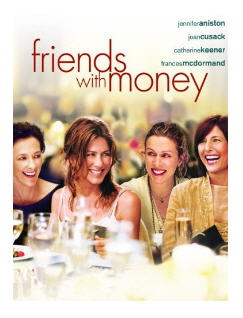I happened across a quirky little film recently, Friends With Money, starring Jennifer Aniston and a talented ensemble cast. It's the story of four friends, three of whom have money, and one who doesn't.
 Aniston plays Olivia, a former teacher, a few years younger than her more established pals in their 40s. She's a maid to keep her head above water, cleaning houses for modest sums of money, and occasionally "appropriating" expensive face cream from her clients.
Aniston plays Olivia, a former teacher, a few years younger than her more established pals in their 40s. She's a maid to keep her head above water, cleaning houses for modest sums of money, and occasionally "appropriating" expensive face cream from her clients.
Olivia's friends are all married, and each has issues of her own – some marital, some personal. Nonetheless, they are intermittently uncomfortable – and judgmental – when it comes to aspects of their friend's life and, in particular, her financial circumstances.
Admittedly, Olivia's world is a bit of a train wreck. She harasses a married man she was once involved with, hooks up with a loser who insists on a cut of her meager wages, and in general, she seems lost.
One of Olivia's more poignant habits involves making the rounds of the cosmetic counters at department stores, collecting as many free samples as she can. Somehow, she's comforted when lining them up meticulously at home on her bathroom shelf. I can only imagine it makes her feel richer in some way. Or at least, less deprived in comparison to her well-heeled girlfriends.
Money, Jobs, and Judgment
Olivia dusts, straightens, and scrubs. She smokes a little pot, moons over the man she can't have, and is kind to an overweight and socially awkward man whose apartment she cleans for a reduced fee, convinced he's unemployed and depressed.
She has little herself, yet in her own way she's generous.
It's an interesting contrast to her friends who spend $10,000 on a charity dinner, yet when Olivia asks to borrow $1800 for a class so she can become a personal trainer (and make a better living), she gets a lecture on why she should go back to teaching. And no, she doesn't receive a loan for the class.
It's fascinating to observe the way money is spent by the three who have it, their assumption that it will always be there, the implicit judgments on jobs and their value.
It's wrenching to watch them criticize Olivia.
"You don't know what it's like," she says. And of course, she's right.
What Can Friendship Survive?
Friendships don't necessarily survive changing circumstances, much less the years that alter us in the process. What appeals to me about this film – beyond its excellent performances – is watching these women. Their relationships hold firm despite depression, marital squabbles, and life's usual disappointments.
Still, friends with money – and one without – isn't an easy mix to manage. In my experience, as a culture we are more accepting of relationship dramas than those that result in financial distress.
- Are your friends critical of your choices, and vocal about it?
- When you lend money, do you feel you have a say in how it's spent?
- Do you have friends with money? And friends without?
- If you have children, have they ever felt shut out by your financial circumstances?
© D. A. Wolf

Big Little Wolf's Daily Plate of Crazy